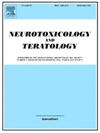A longitudinal study comparing the impact of pesticide exposure on cognitive abilities of Latinx children from rural farmworker and urban non-farmworker families
IF 2.8
3区 医学
Q3 NEUROSCIENCES
引用次数: 0
Abstract
Growing evidence shows that pesticide exposure contributes to numerous adverse health effects. Pesticide exposure can be especially problematic for vulnerable populations, and even more so for children in vulnerable populations who are still developing, such as Latinx children. Several studies have demonstrated the negative cognitive effects of prenatal exposure to pesticides, particularly organophosphates (OPs). We previously reported the results from a baseline study (Dobbins et al., 2022) designed to compare the cognitive abilities of 8-year-old children from rural, farmworking families and urban, non-farmworking families. We found that the children from both populations have considerable pesticide exposure, but to different chemicals. The children of farmworkers had greater exposure to OPs, while the children of non-farmworkers had greater exposure to organochlorines (OCs) and pyrethroids. Using the Weschler Intelligence Scale for Children–Fifth Edition (WISC-V), baseline analyses determined that children of non-farmworkers exhibited lower cognitive scores, specifically on the VSI (visual spatial) and VCI (verbal comprehension) indices. The current study examined the longitudinal significance of these findings in the same participants over a 2–3-year period. We present evidence that children from non-farmworking families exhibited significant declines on the FRI (fluid reasoning index) of the WISC-V. The children from farmworker families did not decline, and this longitudinal difference between the groups was significant. Our findings further suggest that these declines in FRI scores are likely due to greater cumulative OC exposure over the entire longitudinal period.
一项比较农药暴露对农村农场工人和城市非农场工人家庭拉丁裔儿童认知能力影响的纵向研究
越来越多的证据表明,接触农药会对健康造成许多不利影响。农药接触对弱势群体来说尤其成问题,对仍在发育中的弱势群体中的儿童(如拉丁裔儿童)来说更是如此。一些研究已经证明了产前暴露于农药,特别是有机磷农药(OPs)的负面认知影响。我们之前报道了一项基线研究(Dobbins et al., 2022)的结果,该研究旨在比较农村、务农家庭和城市、非务农家庭的8岁儿童的认知能力。我们发现这两个群体的孩子都有相当多的农药接触,但接触的是不同的化学物质。农场工人的孩子更容易接触到有机氯,而非农场工人的孩子更容易接触到有机氯和拟除虫菊酯。使用Weschler儿童智力量表-第五版(WISC-V),基线分析确定非农业工人的儿童表现出较低的认知得分,特别是在VSI(视觉空间)和VCI(言语理解)指数上。目前的研究对同样的参与者进行了为期2 - 3年的纵向研究。我们提供的证据表明,来自非农业家庭的儿童在WISC-V的FRI(流体推理指数)上表现出显著的下降。来自农场工人家庭的孩子没有下降,而且组间的这种纵向差异是显著的。我们的研究结果进一步表明,FRI分数的下降可能是由于整个纵向期间累积的OC暴露增加。
本文章由计算机程序翻译,如有差异,请以英文原文为准。
求助全文
约1分钟内获得全文
求助全文
来源期刊
CiteScore
5.60
自引率
10.30%
发文量
48
审稿时长
58 days
期刊介绍:
Neurotoxicology and Teratology provides a forum for publishing new information regarding the effects of chemical and physical agents on the developing, adult or aging nervous system. In this context, the fields of neurotoxicology and teratology include studies of agent-induced alterations of nervous system function, with a focus on behavioral outcomes and their underlying physiological and neurochemical mechanisms. The Journal publishes original, peer-reviewed Research Reports of experimental, clinical, and epidemiological studies that address the neurotoxicity and/or functional teratology of pesticides, solvents, heavy metals, nanomaterials, organometals, industrial compounds, mixtures, drugs of abuse, pharmaceuticals, animal and plant toxins, atmospheric reaction products, and physical agents such as radiation and noise. These reports include traditional mammalian neurotoxicology experiments, human studies, studies using non-mammalian animal models, and mechanistic studies in vivo or in vitro. Special Issues, Reviews, Commentaries, Meeting Reports, and Symposium Papers provide timely updates on areas that have reached a critical point of synthesis, on aspects of a scientific field undergoing rapid change, or on areas that present special methodological or interpretive problems. Theoretical Articles address concepts and potential mechanisms underlying actions of agents of interest in the nervous system. The Journal also publishes Brief Communications that concisely describe a new method, technique, apparatus, or experimental result.

 求助内容:
求助内容: 应助结果提醒方式:
应助结果提醒方式:


